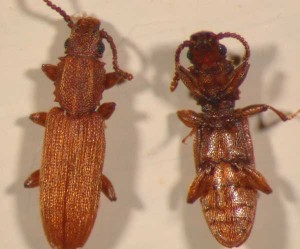
Sawtoothed Grain Beetle
Sawtoothed grain beetle (Oryzaephilus surinamensis)
The sawtoothed grain beetle is the second most common insect pest that infests kitchens and pantries in Michigan (the Indian meal moth is the most common). This insect prefers milled cereal products. Adult sawtoothed grain beetles are slender insects about 1/8 inches long. The usually live for 6 to 10 months, but some may live as long as 3 years. Females lay between 45 to 275 eggs among foodstuffs or on grain kernels. The small, slender, white eggs hatch in 3 to 5 days. Emerging larvae crawl about while feeding. During the summer, the developmental period from egg to adult is about 4 weeks. These insects can infest grain products at any point from the farm storage bin to the warehouse where the finished product is stored, as well as in your own cupboard. The best method of control is to discard the infested products. Check all opened packages of flour, noodles, cereal, and even dog food and birdseed) for beetles, larvae (small, white grubs). Discard any that are show signs of an insect infestation. Next, thoroughly scrub cupboards and kitchen area with strong a detergent. Inspect behind and under appliances for spilled flour or other cereal products that can harbor these insects and remove if found. Once the area is clean, any household insecticide containing pyrethrums can be applied, if you so desire, to kill those missed by the clean up. Storing open packages of dried cereal products in heavy gauge re-sealable plastic bags will protect non-infested foods from egg-laying females.
Be sure to read and follow all instructions and safety precautions found on the label before using any pesticide.




 Print
Print Email
Email




